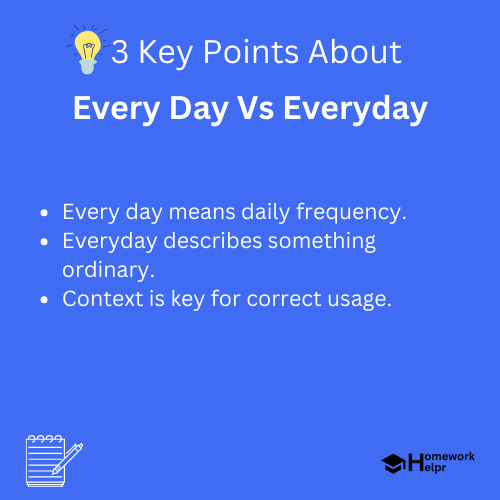📝 Summary
Understanding the difference between every day and everyday is essential for effective communication. Every day indicates a frequency, meaning “each day” or “daily,” while everyday is an adjective that describes something common or routine. Context plays a vital role in their usage; for instance, “I drink coffee every day” signifies a daily habit, whereas “I have an everyday coffee ritual” refers to a routine. Recognizing these distinctions can enhance clarity in writing and speech.
Understanding the Difference: Every Day vs. Everyday
The English language is rich with nuances, and one area where many people often get confused is the difference between every day and everyday. While they sound very similar and may even be used in comparable contexts, their meanings and uses are distinct. Understanding these differences is crucial for effective communication and mastering your language skills.
Definitions of Every Day
The term every day is a phrase that indicates a frequency. It means “each day” or “daily.” When we use “every day,” we are emphasizing that something occurs on a daily basis. For example, one might say, “I go for a run every day.” In this case, the action of running is performed once each day, consistently.
Definition
Frequency: The rate at which something occurs over a particular period of time.
Examples
1. “She drinks coffee every day to start her morning right.”
2. “Students should read for an hour every day.”
Defining Everyday
On the other hand, everyday is an adjective that describes something that is common or routine. It refers to things that are typical or part of our regular lives, often without any special significance. For instance, one could say, “Brushing teeth is an everyday task.” Here, the action of brushing teeth is portrayed as an ordinary and mundane part of daily life.
Definition
Mundane: Lacking interest or excitement; dull.
Examples
1. “Walking to school is an everyday activity for many children.”
2. “The everyday challenges of life can sometimes become overwhelming.”
Context Matters!
A major part of mastering English is understanding context. The importance of context cannot be overstated when differentiating between these two terms. For instance, imagine hearing someone say, “I have an everyday coffee ritual,” versus “I drink coffee every day.” The first statement suggests that coffee is part of a regular routine, while the second implies a habitual action.
- Every day indicates a frequency of action.
- Everyday describes the nature of something as ordinary.
❓Did You Know?
Did you know that the English language has over a million words? Yet, only a small fraction is used daily! This makes understanding nuances like “every day” and “everyday” crucial for clear communication.
More Examples for Clarity
To further grasp the difference, let‚’ delve into some practical examples in various contexts:
- “I study math every day to improve my grades.” ‚Äî Here, the emphasis is on the frequency of studying.
- “His everyday attire consists of jeans and a T-shirt.” ‚Äî This refers to the typical clothing he wears.
- “I jog every day at sunset.” ‚Äî This indicates that jogging is done daily.
- “She enjoys everyday moments with her family.” ‚Äî This highlights the ordinary yet meaningful time spent with loved ones.
Common Mistakes and How to Avoid Them
Many learners of English often mix up these terms, leading to potential confusion in their writing or speech. Here are some common mistakes and how to avoid them:
- Using “everyday” when describing regular actions: Remember, use “every day” when you mean daily actions.
- Confusing “every day” as an adjective: Always remember that “everyday” is an adjective describing commonality.
- Ignoring context: Pay attention to the context in which you are speaking or writing; it can help you choose the right term.
Practical Applications in Writing
When writing essays, stories, or even daily journals, the correct use of “every day” and “everyday” can enhance clarity and make your writing much more professional. For instance, in a personal essay, writing, “My everyday struggles are real,” gives insight into the challenges faced regularly, while “I tackle new challenges every day” emphasizes the ongoing nature of tackling new obstacles.
Definition
Clarity: The quality of being coherent and intelligible.
Exercises to Test Your Knowledge
One effective way to solidify your understanding of these terms is through practice. Here are some exercises to try:
- Write five sentences using every day in different contexts.
- Compose five sentences using everyday describing various situations.
- Find examples in books or articles where either term is used and discuss their meanings in context.
Conclusion
In summary, mastering the difference between every day and everyday can significantly improve your language skills. Remember that “every day” refers to something happening daily, while “everyday” describes something common or ordinary. Through practice and careful attention to context, you can enhance your communication abilities. Now that you understand these distinct yet similar-sounding terms, you can confidently use them in your writing and conversations!

Related Questions on Every Day Vs Everyday
What does ‘every day’ mean?
Answer: Indicates a frequency of action occurring daily.
What does ‘everyday’ signify?
Answer: Describes something routine or typical.
How can I avoid mixing them up?
Answer: Focus on context and meaning in sentences.
Why is it important to differentiate them?
Answer: It enhances communication clarity and avoids confusion.
